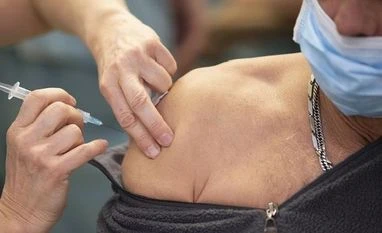The pace of vaccination of the 60-plus population has become sluggish in the past few weeks after an initial high, with healthcare experts attributing it to mobility issues and misinformation and unsubstantiated apprehensions about the jabs.
According to Health Ministry data, 2.29 crore elderly people have been fully vaccinated so far while 6.71 crore have received just one dose of COVID-19 vaccine till now.
The 60-plus population in India was projected to be at 14.3 crore in 2021, so that would imply that just 16 per cent of them have been fully vaccinated till now.
Vaccination for those over 60 years of age and those of 45-plus with co-morbidities started from March 1 at both government and private centres.
On an average about 80.77 lakh vaccine doses were given to the 60-plus population per week between March 13 and April 2, but the weekly figure dropped to about 32 lakh between June 5 to 25, according to the data.
Healthcare experts expressed concern over the slow place of vaccination of the 60-plus people who are more prone to have co-morbidities and remain more susceptible to severe disease.
More From This Section
Dr Sujeet Ranjan, Executive Director of The Coalition for Food and Nutrition Security (CFNS), said myths, misconceptions and rumours about COVID-19 vaccines are the biggest hurdle to vaccination coverage.
"Some people think they will never contract COVID-19, others believe that the virus itself is on the way out. Irrational mistrust of scientifically approved vaccines is also a factor. While vaccine hesitancy has always been a phenomenon in our country, today it tends to accentuated by opinions on social media, where even people with no subject expertise but having wide following can influence people," he said.
"Some people in rural areas believe that COVID-19 is mostly for urban people. Also, many people have heard on the social media that the vaccine and its side-effects will show up two to three years from now. These rumours, suspicion and fear are making it harder to remove vaccine hesitancy," he added.
He said it has also been observed that most public places in rural areas lack senior citizen-friendly infrastructure.
Hospitals have expressed concern over the slow pace of vaccination of 60-plus people who also suffer from the maximum number of comorbidities.
Dr. Shuchin Bajaj, Founder Director, Ujala Cygnus Group of Hospitals, said vaccine hesitancy in the elderly population is a very real issue.
"Among many factors, one is a fear that people with previous heart disease will have some issue because of some unfortunate videos that were circulating around. Some people have done their CRP (c-reactive protein) tests also to see if that was raised and then they feel that they should not take the vaccine," Bajaj said.
Bajaj said mobility is also a very big issue for the 60-plus age group.
"The most important problem is mobility because they are not really able to visit the vaccination centres themselves and also they have a fear that if they go into a crowded place, they will catch Covid. We need to ensure that we educate them about the various risk factors and try to provide vaccination to them at their doorstep," he said.
Dr. Piyush Goel, Senior Consultant- Pulmonary and Critical Care, Columbia Asia Hospital, Palam Vihar, Gurugram, said for mass-scale vaccine coverage, vaccine hesitancy is one of the biggest hurdles.
"As there has been a recent drop in the pace of vaccination among people above the age of 60, there are fears that this vaccine hesitancy can hamper the coverage of this population group most vulnerable to COVID-19," he said.
Dr. Roshan Palresha, Consultant - Emergency Medicine, Columbia Asia Hospital, Pune, said the recent drop in Covid vaccine coverage among the 60-plus group of people is a cause of concern as they are more prone to have comorbidities, and remain more susceptible to severe disease.
People aged 60 and more must understand that while the number of infected people may go up or down, their vulnerability to the disease and chances of mortality remain the same, and can be reduced only with vaccines," he said.
"In the past we have successfully reduced cases of HIV/AIDS and polio through sustained and focussed media campaigns, and it should help this time too. Government representatives must engage in dialogue with these people and may also come up with non-financial incentives to encourage people," he suggested.
Dr. HK Mahajan, Anesthesiologist, Indian Spinal Injuries Centre, Vasant Kunj, said focus should be on getting across two key vaccine messages -- vaccines provide protection against COVID-19 and vaccines are safe.
Mahajan said vaccine hesitancy in people over the age of 60 years in India could also be because of misinformation, myth and skepticism.
To counter this, Mahajan suggested that front-line health workers and hospitals should issue statements in favour of vaccination.
"Influential people like film actors, famous personalities should also be tapped to appeal to the public to get vaccinated," he said.
)